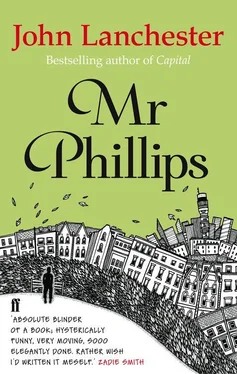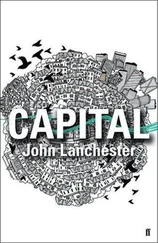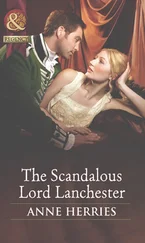A tour party comes out of the next gallery at the end of the room, the man at the head of the party looking shifty as he walks past Mr Phillips and his new chum. Mr Phillips wonders if it is the same man with the posh voice who thought that the signs of dementia spoke for themselves. A light enters the woman’s eyes and she peels off to follow the group, squeezing Mr Phillips’s arm in abrupt farewell as she leaves.
Outside the gallery Mr Phillips takes a couple of lungfuls of London air at the top of the steps. The sky is now clear and blue, and it is hot. Beside him stands a girl with black sandals and red feet.
‘You have time?’ she says in a Spanish or Portuguese accent. A voice in Mr Phillips’s head says If you’ve got the inclination and If you’ve got the money and You interest me strangely and But this is so sudden. The voice that comes out of his mouth says:
‘Five past eleven.’ The girl nods and bites her lip.
Mr Phillips goes down to the Embankment and turns left towards Westminster. Across the Thames the sun is bright on the huge colourful building, all trees and ziggurats and pyramids and long glass windows, that houses the Secret Service. As always when he passes the building Mr Phillips stops for a look. You never see anyone moving about inside it, or going into it from the street in Vauxhall, so clever things have obviously been done with the doors and windows. At the same time there is something odd about spies going to work in a brand-new office building that is one of the most conspicuous and extrovert and obviously expensive in the whole of London.
It would be good fun to be a spy, and never to be allowed to tell anyone what you did. Not even Mrs Phillips, except in the most general terms. Certainly not Martin or Thomas. As for the neighbours, they would only know that you were something in the civil service, probably to do with fish quotas or harmonising EU policy in relation to tractor parts. And all the time you were standing at a barbecue while the man on your right boasted about his new Rover 816 and the man on your left talked about the council’s inability to empty the bins without leaving more mess strewn all over the road behind them than there was before they started, you would be thinking about whatever it was that spies thought about, and the main thing would be that nobody would have the faintest idea what was on your mind. And when Mrs Phillips says something like ‘What are you thinking?’ or ‘A penny for them?’ you wouldn’t be able to tell her, by law. You wouldn’t be able to say, ‘I’m worried about the quality of information we’re getting back from our network in Tripoli via his dead letter microdot burst transmission’ — you would have to say instead, ‘I was wondering whether after all we should have pushed Tom to keep up with his piano lessons’ or ‘Just trying to remember where I left the remote control, darling.’
The traffic has improved very slightly and Mr Phillips doesn’t feel as if the air is quite so edible with impurities. He heads along the Embankment towards Westminster. A walk: that is the idea. It has been years since he travelled around central London on foot — literally years, not since his bachelor days when he had lived in Shepherd’s Bush and would often travel into the West End to meet friends and go to the pub or whatever. It goes without saying that not walking is one reason he is now so fat; driving, like marriage, makes men fat.
The only pedestrians in this part of town at this time of day are occasional stray tourists. All the office workers have arrived at the office and are happily or unhappily immersed in their days. At about this point on a normal day Mr Phillips would be in a meeting, since eleven o’clock conferences were a regular feature at Wilkins and Co. Today being the last Monday in the month he would normally expect to be in a budget meeting with the planning department, which essentially involved sitting there listening to them drone on before he and his colleagues could take away the figures and shoot lots of holes in them. This could be done at the meeting, but Mr Phillips preferred to do it by memo since he didn’t have much appetite for the confrontation involved — which would often be considerable, since the planning department was strikingly, remarkably, bad at sums. Their projected cost for insulating the offices at the company’s main plant in Banbury had once been wrong by 173 per cent.
When he was younger Mr Phillips had hated meetings. Or at least he had once he had got over the grown-up feeling, the warm glow of inclusion, of being invited to his first meeting with his first employers, Grimshaw’s. Children and students didn’t have meetings; only adults, serious employed people had them. So at the start there was the sense of being a big boy now. But Mr Phillips soon came to dread the whole business of sitting around a table with colleagues pretending to decide things. He hated the rooms in which meetings took place, with their horrible large tables and nasty chairs, with arms for the important people at the ends of the room, and the dank smell of the company coffee on the hotplate, and people’s briefcases, calculators, pencils, notebooks, agendas, personal organizers, beepers, copies of last meeting’s minutes, all of it. Most of all he hated the feeling that they were all impostors or impersonators, and with it the feeling that they were conspiring together to kill time, so that every second in the meeting was being wilfully murdered, bludgeoned to death. At other times he felt that it was more casual, as if the time was just being pissed away, the way you might piss away hours in the pub or by watching bad TV, or Martin and Tom would by playing a computer game.
It would be possible to calculate how much time in the course of a life was spent not doing anything. Obviously sleep was controversial in this context, since you could count that as either doing something or not. For Mr Phillips it is very much an activity, and an important one. So excluding that, Mr Phillips reckoned that he had spent, not doing anything:
— as a child before school age: six hours a day, conservatively, excluding time spent being fed, taught to read etc., time playing with other children, fending off his sister. This figure would have gone up once his sister went to school, but still.
— school years: about an hour a day, not much, but then they kept you pretty busy; when they were at school Martin and Tom seemed to have much more free time than he ever did.
— at college: four hours a day, if this included pub, watching TV, what the boys now called ‘hanging out’.
— first years at work and doing his articles: about an hour a day. Mr Phillips had been so tired he often would make no plans for evenings or weekends, except when he was actively involved in looking for a girlfriend.
Then, once Martin was born and for the next fourteen years while he and Tom were growing up to, say, generously, fifteen minutes a day when at home. (Mrs Phillips even less — indeed she feels the whole time issue much more keenly than Mr Phillips. ‘With small children you spend so much time just with them,’ she says. ‘You’re not doing anything, you’re just with them. I love them, but it’s still a bit much sometimes.’) During these years most of the free time Mr Phillips had — time spent without someone making an active demand on him or without doing something he was supposed to be doing — was at work. So the emphasis of free time shifted from home to work. Say he spent one and a half to two hours a day at work not doing anything — pretending to work, looking out of the window, sitting in meetings not listening etc. And once Tom was in full-time school, say four hours a day of nothing time, allowing for the same amount of time at work and considerably more at home. Obviously these are rough figures. So then the calculation would be:
Читать дальше




![Unknown - [Carly Phillips] The Bachelor (The Chandler Brothe(Bookos.org) (1)](/books/174132/unknown-carly-phillips-the-bachelor-the-chandle-thumb.webp)







